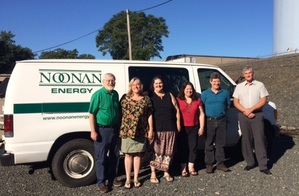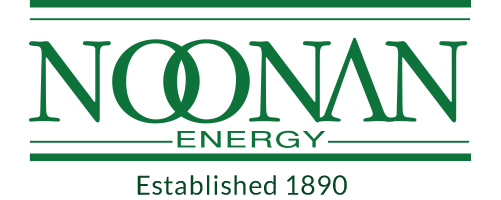At Noonan Energy we are always looking out for our customers and they often have questions about their homes. We recently got together with some of our customer service representatives and asked them what questions customers frequently ask.

Q: What is a vent alarm?
A: A vent alarm is a small device that is typically installed between your oil tank and vent pipe, it signals that the tank is full.
Q: How does a vent alarm system work?
A: When oil is pumped into your tank, air is displaced from inside the tank through vent pipes. As air passes through the vent and the attached vent alarm, it makes a whistling sound which stops when the tank is full.
Q: Why does my gauge only read ¾ when we asked for a fill?
A: It is required by law for the vent alarm to go down 6 inches into the tank. As the oil is poured into the tank at a high speed there is about 3” of foaming. So when the whistle goes off, we will stop with about 9 inches of space from the top of the tank. Therefore, we can never fill the tank completely and that is why the gauge reads about ¾ full.
Q: Why should I have a vent alarm system?
A: A vent alarm system will help prevent a release of oil into your cellar or to the environment due to accidental over pumping of oil into a full tank. State law now requires a vent alarm be installed on all oil tanks.
Q: Is it necessary to have a liner for a chimney?
A: From a state fire code perspective, oil systems are not required to have liners at this time. However, the state gas code requires that all newly installed gas systems have a chimney liner to prevent carbon monoxide emissions from leaking into the home itself and to prevent flu gas condensation from the new high-efficiency systems.
Q: How often should the chimney be cleaned and checked?
A: At Noonan Energy we cover the bases by conducting a basic inspection during our annual tune-up. For more information, please visit csia.org.
Q: Should I have my ductwork cleaned?
A: This all depends on the system. We do not officially recommend one way or the other. Depending on the system, a duct cleaning could cause damage. Check out this helpful guide from the US Environmental Protection Agency to see if the air ducts in your home should be cleaned.
Q: Do I need a tune-up every year for my heating and cooling system?
A: Most equipment warranties still state that a tune-up is needed annually for efficient use.
Q: How do I know when it is time for a delivery when I am on an automatic plan?
A: At Noonan, we have a system in place to calculate how often a customer needs fuel. In basic terms, we use degree days and K-factor to determine when a customer will require a delivery. A degree day is simply a unit for measuring how cold (or hot) it has been over a 24-hour period. Whenever the daily average is below 65 degrees, you have a degree day. Once you have the mean temperature for the day, you subtract this from the base temperature of 65 degrees and you have your daily degree day. For example, a daily mean of 60 degrees would be considered 5 degree days. We also use what’s called a K-factor that shows how fast a particular customer uses fuel (similar to miles per gallon). With this information, we can calculate how many days a particular customer can go before needing fuel. Finally, and perhaps most importantly, we build in a reserve to ensure that your tank is never allowed to run out.
Q: When resetting my heating system, are there any hazards I should be cautious of?
A: It is very important to push the restart button only ONCE. If the button is pressed multiple times, fuel can flood into the combustion chamber. Once it finally does restart, there will be a lot of oil in the chamber which could present a fire hazard, depending on how many times the button was pressed.
Q: What temperature can I safely set my thermostat to if I am going away for the winter?
A: The thermostat should be set no lower than 50 degrees to keep all the pipes and appliances from freezing.
Q: When should I check and change the battery in my thermostat?
A: A helpful way to remember is to change it when you change the batteries in your smoke detector.
These are just a few frequently asked questions that you might need to know when it comes to heating and cooling for your home. For more information, please call 800-343-8829 or visit, noonanenergy.com to learn more about how Noonan Energy can help with your home owning needs.

